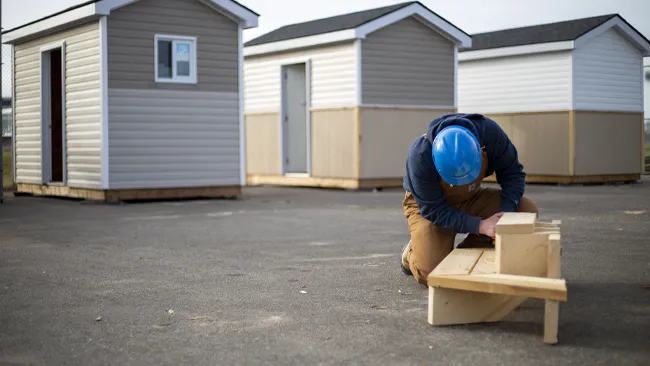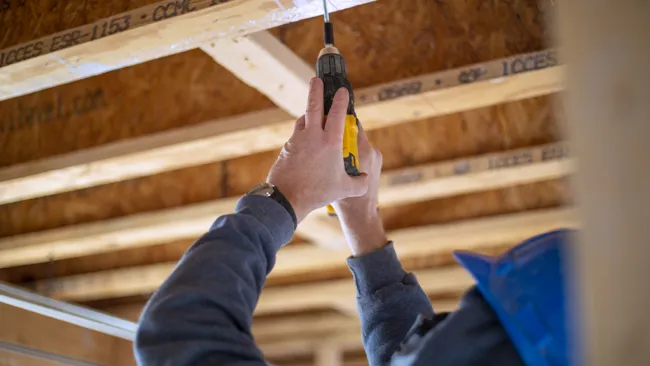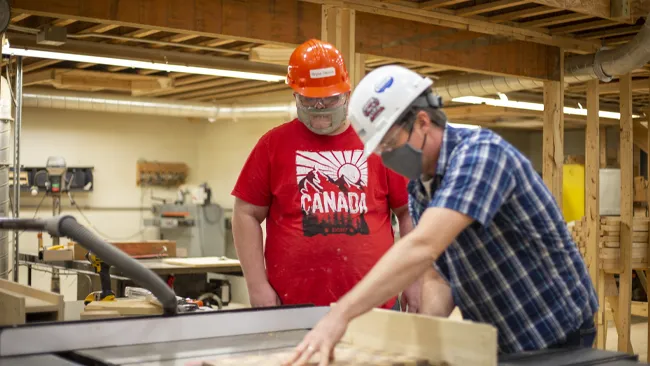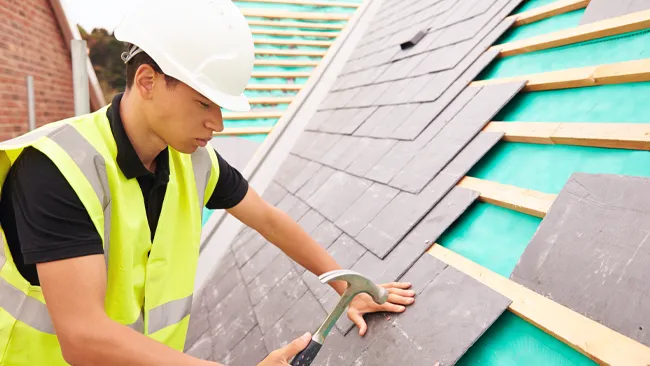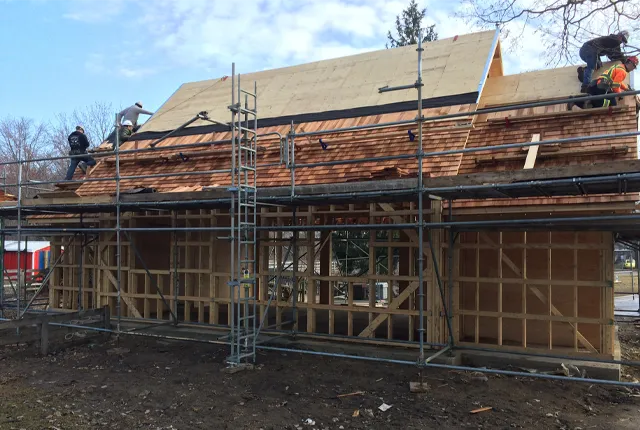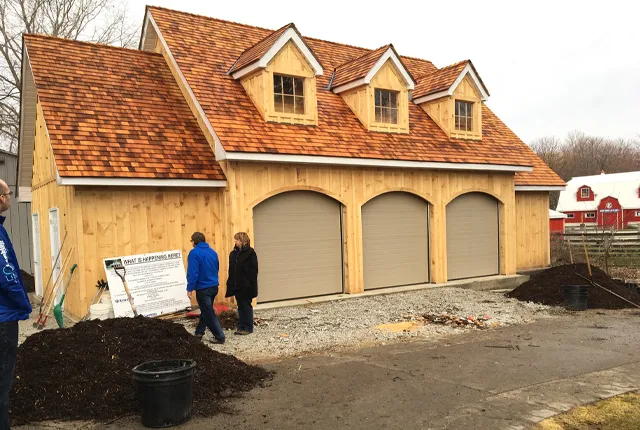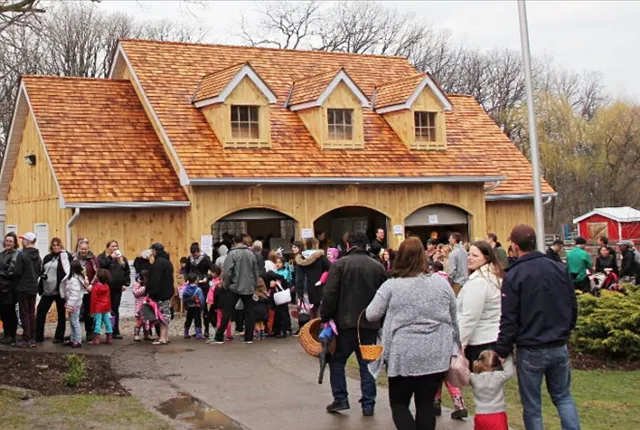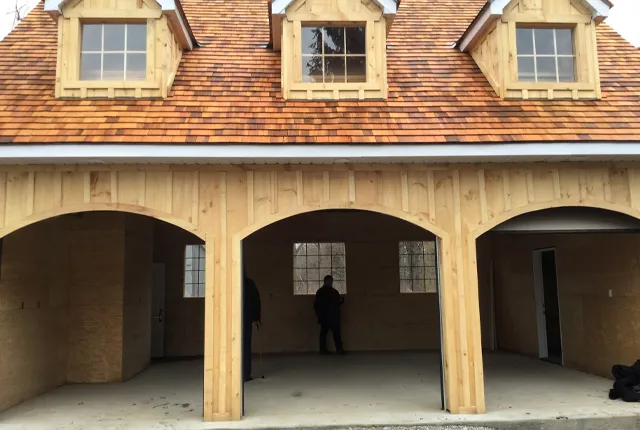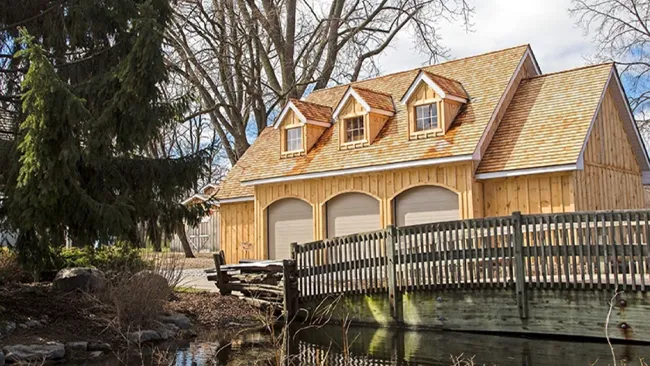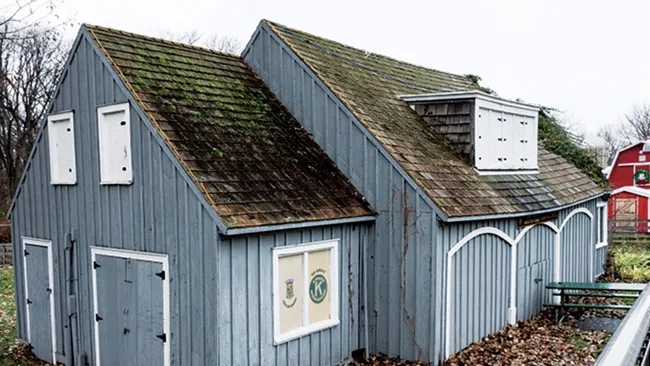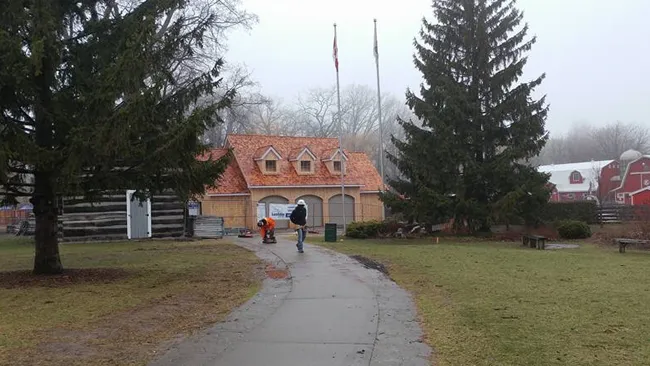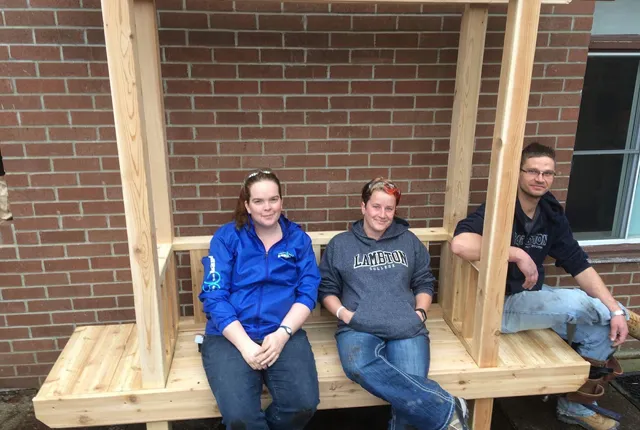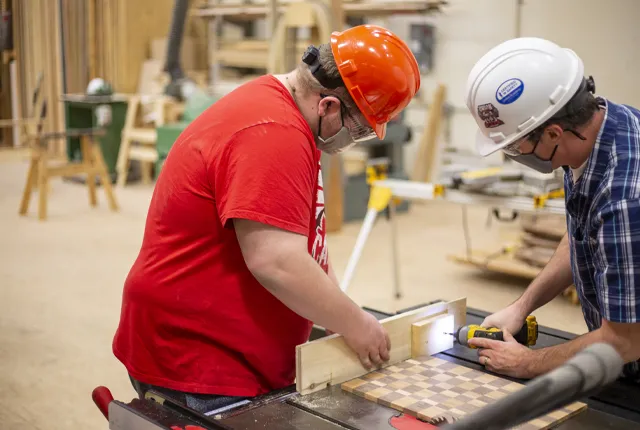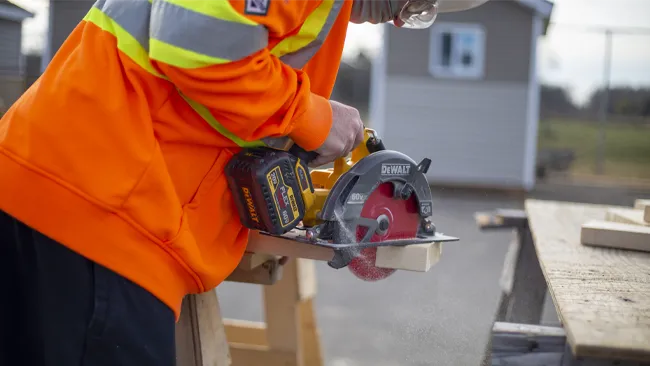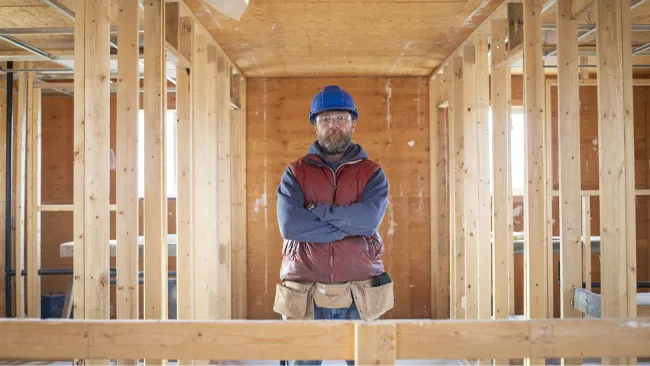
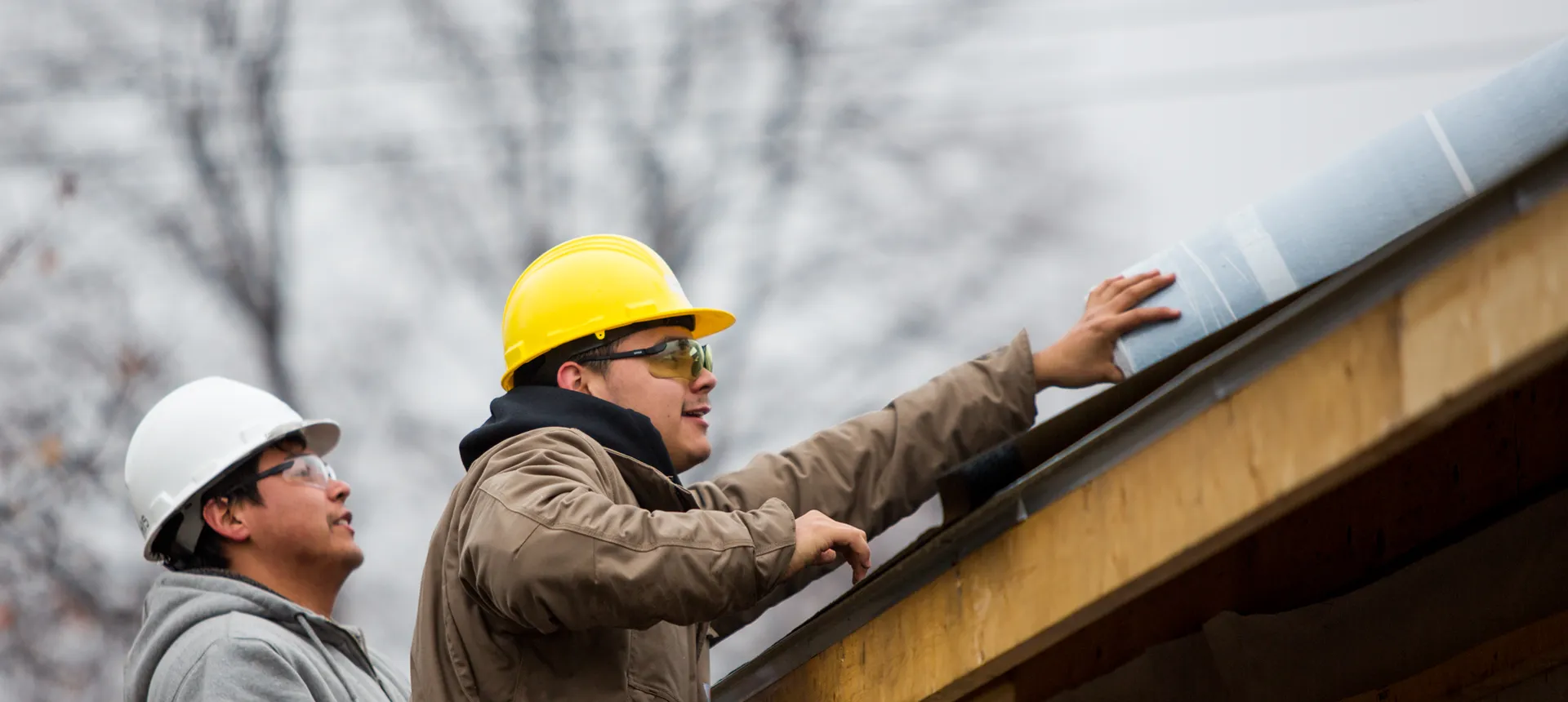
Renovation Construction Technician
Overview
This program is dedicated to transforming outdated and inefficient learning environments into modern and innovative spaces that inspire and engage students.
In five terms - one of which is a co-op - students will cover advanced interior finishes, decks and porches, cabinets, trim, advanced exterior finishes, plumbing and electrical situations, as well as additional components to renovation construction with an emphasis placed on eco-friendly building practices, and residential and small commercial framing and layout. Through hands-on projects utilizing Lambton College's 6,500 sq. ft. shop and 1,800 sq. ft. teaching house, theory is applied daily. Renovation Technician students will participate in community-based learning projects and/or capstone projects and experiential learning either working with non-profit organizations such as the Seaway Kiwanis Club, Inn of the Good Shepherd, or Habitat for Humanity.
Training is safety-based and business-focused. Courses in computer estimating and project management are key to the well-rounded education offered in this program. All training has a strong focus on safety and energy efficiency, construction, and design. Students may also attend annual trade shows and visit local job sites in the community where they will have the opportunity to network and learn from local industry experts.
Why Choose this Program?
Admission Requirements
O.S.S.D. or equivalent with:
- Grade 12 English C or U
Mature Student Assessment for this program is available in the subject of English for the purpose of demonstrating proficiency in this required admission subject. For all other admission requirements, applicants must complete the required course(s) as listed above. For more information, please contact counselling@lambtoncollege.ca. Review the Mature Student Admission process.
Academic admission requirements can be obtained through Academic Upgrading and the Pre-Programs at Lambton College.
Jason's Story
Experiential Learning in our Community
Our students spend a lot of time working on projects that benefit the Sarnia-Lambton Community. Take a look at some of the amazing work they've done locally.
Costs
- Year 1 $4,600.94
- Year 2 $4,518.94
Please Note: These fees apply to the 2024-2025 academic year and are subject to change. Fees do not include books (unless specifically noted), supplies or living costs.
Additional Fees
-
Nail Pouch & Belt$60.00
-
Construction Hard Hat$20.00
-
Safety Glasses$10.00
-
Hammer - 20 oz$30.00
-
Tape Measure - 25' metric/imperial$12.00
-
Speed Square$15.00
-
Utility Knife$10.00
-
Nail Sets$10.00
-
#2 Robertson Bit Set for Cordless Drill$15.00
-
Stair Square Guides$10.00
-
CSA Approved Safety Boots (Green Stamp)$100.00
Women in Technology & Trades
Discover how Lambton College's Women in Technology & Trades (WiTT) group is empowering women to excel in technology and trades.
Visit our WiTT page for more information on mentorship opportunities, events, and resources designed to support your journey in these dynamic fields.
Learn More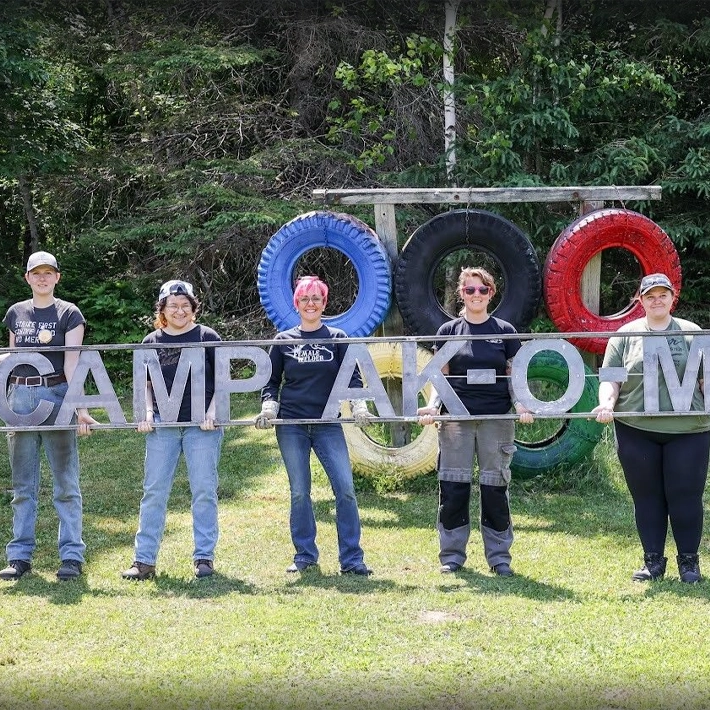
Scholarships Available
There are 9 scholarships available for this program, with a total value of $1,000!
Technology Requirements
In order to keep pace with the requirements of each and every course in your program, Lambton College requires that each student have access to a laptop while studying at our college.
Labs & Equipment
Courses
Safety, Tools & Materials
The student will be presented with information for the care and safe use of hand, portable and stationary power tools including saws, jointers, planners, routers, biscuit joiners and drills. Students will study the production and physical characteristics of materials used in construction including solid wood and manufactured construction products, fasteners and adhesives. Students will utilize the information given and apply it to practical wood working projects with a keen emphasis on technique, while demonstrating tasks safely.
Construction Plans, Specifications & Codes
The student will develop the knowledge regarding identification and interpretation of the different types and aspects of architectural drawings and related equipment. The student will develop the ability to read and interpret drawings and sketches from oral and written information. The student will also develop the knowledge and skill in drawing and sketching plans from oral and written information.
Introduction to Surveying
This course will introduce the learners to the techniques and procedures of surveying and layout for construction projects. Surveying and layout practices and calculations will be studied in class and demonstrated in field exercises. Setting up basic surveying and layout tools and performing various building layouts will be major components of this course. Learners should be prepared to complete outdoor field exercises during this course.
Job Search & Success
This course provides student with skills and knowledge to help support their career search and succeed in the workplace. Students align their personal skill set and goals to guide them on their career paths. They will learn how to effectively conduct a job search, build a professional and well-tailored resume and cover letter, and develop and practice interview techniques. Students will also develop their personal brand to help support effective career networking and aid in their job search. Teamwork and collaboration in the workplace are also discussed. Self-reflection is used to inspire insight and support their professional career journey.
Estimating & Calculating I
This course will develop the student's understanding of trade calculations and the ability to apply them to industry-related problems. A student in this course reviews basic arithmetic using whole numbers, fractions, and decimals; converts metric and imperial measurement; solves triangles using ratios and trigonometry; and defines and applies the properties of various geometric shapes.
Foundations Systems
Students will develop an understanding of the numerous components and associated installation practices that combine to produce typical residential and light commercial structures. Several residential forming systems, as well as ICF will be studied in detail. Practical activities and assignments will support the delivery of this subject matter.
Introduction to Business
This course introduces the student to the modern world of business. It examines the significance and composition of Canadian business, discusses current factors and trends in the business environment, explores how businesses are organized and managed, and provides a brief discussion on the topics of entrepreneurship and business etiquette.
Energy Efficiencies & Sustainable Construction
This course will offer students an introduction to energy efficient building techniques, state of the art energy conserving systems and sustainable building approaches. Specific subject to be covered will include the basics of Heat Transfer, Building Envelope, Insulation Techniques, and New Technologies in electrical and heat generation.
Introduction to Interior Finishing
This course introduces students to the principles, regulations, standards, systems, materials, and details of standard residential floor, wall and ceiling surface treatments, and the finishes applied to them. The focus of this course will concentrate on the areas of Drywall/Drywall Finishing Compound and Tape, Interior Doors, Stairs, Trim, and Mouldings. Students will also concentrate their efforts in quantifying and estimating materials and studying installation practices for interior finishes.
Introduction to Exterior Finishing
This course introduces students to the principles, regulations, standards, systems, materials, and details of standard residential exterior finishes. This course will focus on the building envelope, exterior windows, doors, vinyl/wood siding and roofing. An emphasis will be placed on choosing materials, interpreting the building code, installation techniques and quantifying materials. Students will demonstrate these methods in the lab portion of the class.
Workplace Communications
This course focuses on skills required in any organization or position: writing business documents, responding to realistic scenarios, and speaking in an organized and vibrant manner. Students will practice professional and inclusive communications skills by producing, revising, and editing short business documents and engaging in verbal interactions and presentations.
Construction Safety
This course will focus on the fundamental concepts of the Occupational Health and Safety Act with specific reference to federal and provincial legislation. Leaners will identify and recognize workplace responsibilities, health issues, hazard concerns, controls, and WHMIS. Learners will construct scaffold systems and demonstrate ladder safety. Hoisting and rigging will also be studied extensively.
Introduction to Framing
This course will introduce the learner to residential framing methods and materials. It will concentrate on modern platform framing techniques, laying out of on-centre spacings, construction of floors, walls, rafters and trusses. Gable and Hip roof construction will be studied in detail. Green construction techniques related to framing will also be discussed in depth.
Co-op Work Term (optional)
Co-operative education provides students with the opportunity to apply classroom learning to the workplace, undertake career sampling and gain valuable work experience that may assist students in leveraging employment after graduation.
Renovation Project Management
In this course, students will become familiar with the concepts of project organization, time management, scheduling, coordinating with other trades, materials take off and estimating for construction projects.
Advanced Exterior Finishes
This course builds upon the earlier skills understood in CCT-2143 Introduction to Exterior finishes. Skill development in the installation of cornices, soffit, aluminum exterior capping of windows, and doors, flashings, exterior door installation, and fibre cement siding (Hardie board) will be a focus. Estimating and quantifying materials along with terminology and installation practices will be a central theme in theory and will transition to laboratory part of the class where students will demonstrate these topics.
Advanced Surveying & Layout
This course will introduce the learners to advanced calculations, practices, and practical applications concerning surveying and layout. Learners will set up more advanced survey tools and use them to perform advanced building layouts. Topographical map interpretation and vertical and horizontal angles layout an calculations will be studied in detail. Learners should be prepared to complete outdoor field exercises during this course.
Computer Applications & Estimating
This course will introduce students to the use of word processing and spreadsheet software program. Students will build estimating databases and project estimating spreadsheets using these programs.
Introduction to Design
In this course students will be able to identify, describe and compare various styles of architectural designs with a focus on residential buildings. An overview of the history of design, space planning, trends, colour, and interior and exterior detailing will be the main focus. There will be an emphasis on finishes and materials as well as determining client's needs such as patterns of foot traffic, new or additional appliances and fixtures, and new technology (home security, home theatres, and computer systems).
Decks & Porches
This course will focus on the special requirements for constructing decks and other unprotected wooden structures. Students will be introduced to construction materials and methods for wood, plastic and composite decking systems.
Electrical & Plumbing Techniques for Renovations
This course will introduce the learner to various plumbing and electrical issues that renovators encounter on a residential construction site. This course will provide the learner with knowledge of how residential and municipal plumbing and electrical systems operate, as well as understanding energy efficiencies that can be gained using environmentally friendly techniques and products.
General Education Elective
Electrical & Plumbing Systems for Renovations
This course will introduce the learner to various plumbing and electrical issues that renovators encounter on a residential construction site. This course will provide the learner with knowledge of how residential and municipal plumbing and electrical systems operate, as well as understanding energy efficiencies that can be gained using environmentally friendly techniques and products.
Computer Applications & Estimating
This course will introduce students to the use of word processing and spreadsheet software program. Students will build estimating databases and project estimating spreadsheets using these programs.
Advanced Framing
This course builds upon the earlier skills understood in CCT-2133 Introduction to Interior Finishes. Skill development in the installation of advanced interior trims, mouldings, wainscotings, suspended ceilings, floorings and stairs will be a focus. Estimating and quantifying materials along with terminology and installation practices will be a central theme in theory and will transition to the laboratory part of the class where students will demonstrate these topics.
Computer Assisted Drafting
The student will be introduced to an architectural software (Softplan) that will aid and assist them in the stages of the renovation process with a focus on layout and interior design. SoftPlan is an architectural design software purposely created to help speed up the process of making and managing home designs. With SoftPlan, students will have a platform that lets them create accurate construction documents faster than they would by hand. To performing commands, recognizing and understanding files, creating and modifying drawings, students will learn first hand how this software can transform any renovation or new build.
Advanced Finishes
This course builds upon the earlier skills understood in CCT-2133 Introduction to Interior Finishes. Skill development in the installation of advanced interior trims, mouldings, wainscotings, suspended ceilings, floorings and stairs will be a focus. Estimating and quantifying materials along with terminology and installation practices will be a central theme in theory and will transition to the laboratory part of the class where students will demonstrate these topics.
General Education Elective
Contact
Program Information
Applied Science, Engineering Technology & Trades
After Graduation
Employment Opportunities
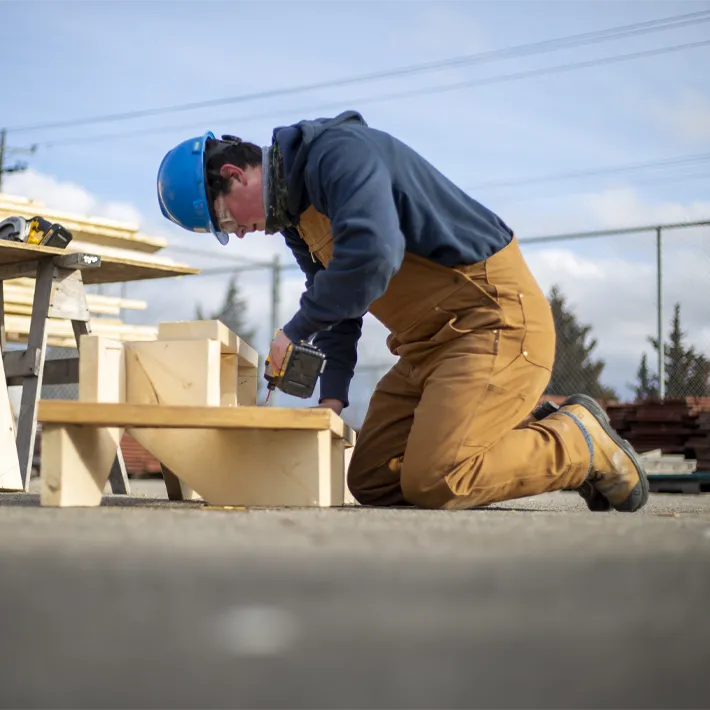
Graduates of this program may find employment in the expanding residential renovation industry, new house construction, house additions, house framing, flooring installer, drywall, interior and exterior finishing and entrepreneurship. The program could allow students to enter into the General Carpenter Apprenticeship program once they have found employment.
The construction carpentry trade is currently in need of qualified trades people. The construction sector shows significant demand and growth resulting in all graduates finding employment in a construction-related field where they put the skills acquired to work.
Accreditations & Certifications
Trade Certificates
Graduates of this program obtain certificates in Working at Heights (WAH), First Aid and CPR, Scissor and Boom-lift certification and WHMIS.
Diploma to Apprenticeship
Graduates of this program have a laddering opportunity with the General Carpenter Apprenticeship program.
Qualified students who have obtained their diploma will seek their own General Carpenter Apprenticeship. Students will then be exempt from the in-school portion of the basic level General Carpentry Apprenticeship.

Co-op
About Co-op
Students in this program have the opportunity to gain valuable work experience by applying classroom learning during co-op experiences.
Learn more about co-op terms and the roles and responsibilities of students and co-op advisors.
Program Capabilities
Program Capabilities outline what skills students should possess as they progress through each term/year of their program.
Students and employers will find this information most useful and can reference either the list of skills or the full program capabilities document to ensure students are gaining the experience they need to fulfill the program requirements.
More Information
Technology Requirements
It is recommended that students purchase a laptop with a Windows operating system.
Internet Speed Requirements
For best performance for students learning remotely, an internet connection with a minimum of 40 Mbps download and 10 Mbps upload speed is recommended in order to effectively use video conferencing and remote lecture delivery software as well as, other online resources remotely. Due to the large area over which students may be dispersed, we are unable to recommend a specific provider, so you will need to inquire around your area to find one that best suits your needs.
Minimum Laptop Requirements
In order to access the internet and virtually-delivered software and courseware, student laptops should include the following at a minimum. By meeting the following specifications, students will be equipped to access software and courseware on their laptop through the internet:
- Intel i5 8th Gen Processor or equivalent
- 16 GB of RAM (with a minimum of 8 GB)
- 100 GB HDD or more
- HD Graphics
- Webcam with a microphone
- Wireless 802.11n/ac 5ghz capable
- Windows Operating System (Windows 11)
Please note that Chromebooks and MacBooks may not support all software required for your program; students should verify compatibility with their professors.
Software
To ensure students are getting the most our of their classroom experience, some software will be required.
Lambton College has made this software easily accessible online. Students can leverage our Microsoft Office 365 software packages and services. In addition, much of the software you require for your courses will be available on demand for use on any device - on or off campus.

